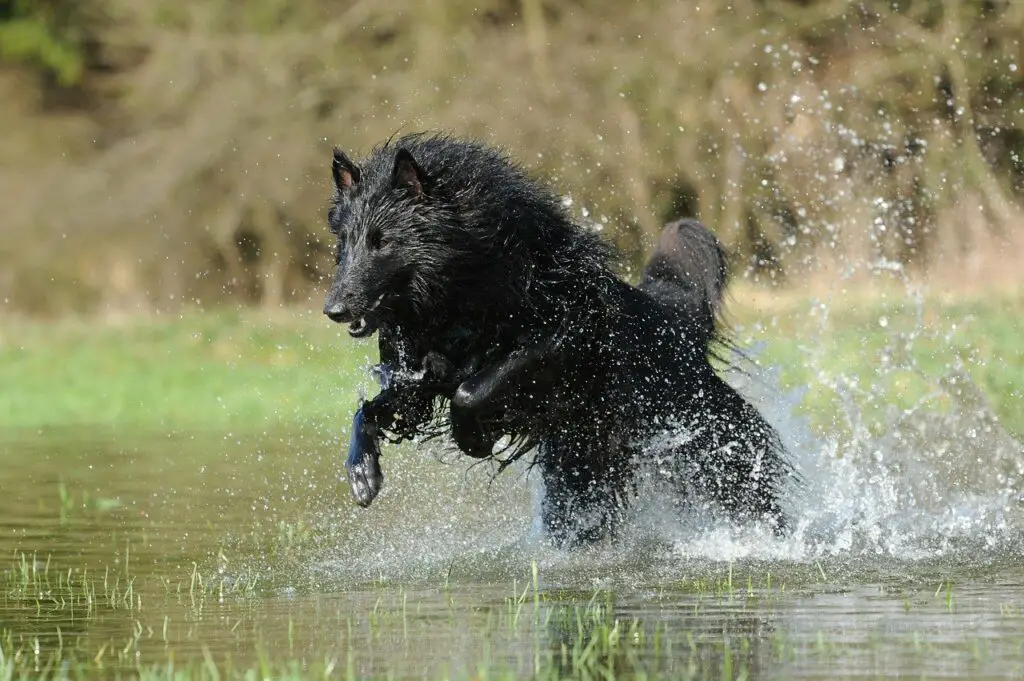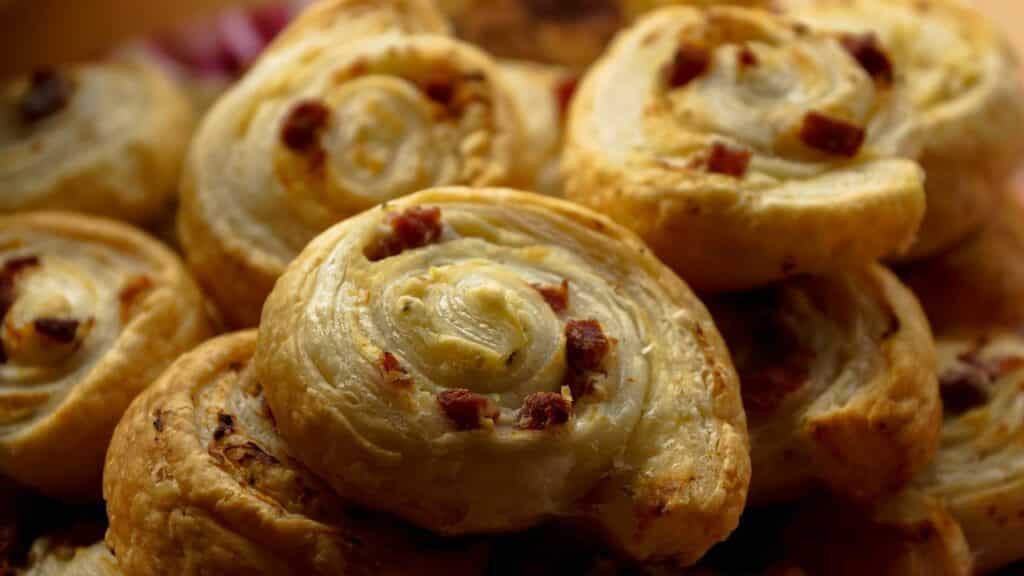Dogs are like people in a lot of ways.
They both enjoy good food, and would sometimes want to indulge in something unhealthy.
Every time you hold a bowl of cheese puffs, you’ll see your furry friend drooling at it.
So, can dogs eat cheese puffs?
No, cheese puffs contain high sodium and fat content which are unhealthy for dogs.
Giving your dog cheese puffs will expose him to diseases like diabetes.
You’re in charge of your dog’s health and one way to ensure his safety is by feeding him healthy foods.
Knowing why dogs should not eat cheese puffs will help you make better decisions for your pup.
Keep reading to understand these reasons and alternative safe treats for your canine.

Reasons Dogs Should Not Eat Cheese Puffs
Although healthy, nutritious, and tasty for humans, cheese puffs pose several dangers to dogs.
These dangers are a result of the following ingredients in cheese puffs:
- Sodium
- Fat
- Sugar
These ingredients expose dogs to the following risks:
Sodium Ion Poisoning
Sodium ion poisoning or salt toxicity in dogs is a fatal condition.
Salt toxicity occurs when a cat consumes 2-3g/kg of sodium chloride.
Excessive salt (hypernatremia) in a dog’s blood causes the muscles to lose moisture, stiffness, and shrivel.
The excessive salt also pulls water from the blood into the intestines, which causes bloating, vomiting, and diarrhea.
Other symptoms of sodium ion poisoning in dogs include:
- Seizures
- Shortness of breath
- Muscle tremors
- Lethargy
- Coma
Fatty Liver Disease (FLD)
FLD is a common disease in dogs that eat high-fat diets.
Cheese puffs contain unhealthy fats like palm oil and soybean oil.
When there’s too much fat in a dog’s liver, the liver cells become damaged and can’t function properly.
This leads to a buildup of toxins in the blood.
Symptoms of FLD include:
- Weight gain
- A poor appetite
- Vomiting
- Abnormal stool (greasy and foul-smelling)
- Diarrhea
- Lethargy
- Jaundice (yellowing of the skin and whites of the eyes)
Sugar Overload and Obesity
Sugar is necessary for a dog’s diet but too much of t can lead to obesity.
Cheese puffs contain a high amount of sugar that’s unhealthy for your furry friend.
Dogs who consume a lot of sugar are at risk for the following health problems:
- Stomach upset: Too much sugar is hard for dogs’ digestive systems. When a dog’s stomach is upset, he may vomit, have diarrhea, bloat, or experience indigestion.
- Diabetes: Like humans, dogs can develop diabetes if they consume too much sugar. Diabetes in dogs is a severe disease that can lead to blindness, kidney failure, and even death.
- Obesity: Dogs who eat sugary foods are at risk for obesity. Obesity can lead to other problems like arthritis, heart disease, and respiratory problems.
- Tooth decay and gum disease: Sugar creates a conducive environment for harmful mouth bacteria to grow. These bacteria can cause tooth decay and gum disease.
- Behavioral problems: Dogs who consume too much sugar may become hyperactive and have difficulty concentrating.
Dehydration
Dogs that consume food with high salt content are at risk of dehydration.
Salt makes dogs thirsty, and they’ll drink more water to quench their thirst.
When a dog’s body lacks enough fluids, oxygen delivery to organs and tissues is reduced.
This leads to an electrolyte imbalance due to low potassium, sodium, and chloride levels.
These minerals are responsible for:
- Regulation of nerve function
- Movement of nutrients into the cells
- Maintaining a balance in the body’s pH
- Ensuring efficiency in muscle function
Dehydration in dogs is a severe condition that can be fatal.
Symptoms of dehydration include:
- Lethargy
- Dry nose
- Dry mouth
- sunken eyes
Pancreatitis
Pancreatitis is a severe inflammation of the pancreas linked to unhealthy fats and chemicals.
The condition causes the spillage of digestive enzymes from the pancreas into the abdominal cavity.
The spillage damages the liver, intestines, gallbladder, and bile.
Acute pancreatitis in dogs is not easy to heal.
Dogs that recover from acute pancreatitis experience bouts of disease due to relapsing pancreatitis.
Symptoms of pancreatitis in dogs include:
- Vomiting
- Diarrhea
- Lethargy
- Abdominal pain
- Fever
- Weight
Gastrointestinal Issues
Gastrointestinal issues are common among dogs that consume food with high salt and fat contents.
When salt pulls water into the intestines, it causes bloating and diarrhea.
The fatty acids in cheese puffs can also lead to indigestion, diarrhea, and vomiting.
Dogs that eat cheese puffs are also at risk for intestinal blockage.
This occurs when a foreign object lodges in the dog’s intestines.
The blockage prevents the dog from passing stool and can be fatal if not treated immediately.

Alternative Safer Treats for Dogs
Due to the dangers of cheese puffs, it’s best to give your dog alternative safer treats for his health.
Some safe treat options for dogs include:
- Veggies: Dogs love vegetables like carrots, green beans, and broccoli. These veggies contain nutrients and fiber that are good for your dog’s health.
- Fruits: Dogs can also enjoy fruits like apples, bananas, and watermelons. Fruits are a great source of vitamins, minerals, and antioxidants.
- Meat: Dogs love meat, and it’s a great source of protein. You can give your dog cooked chicken, turkey, or beef as a treat.
- Cooked rice: Rice is a good source of carbohydrates, vitamins, and minerals.
- Homemade treats: You can make homemade treats for your dog using healthy ingredients like peanut butter, oats, and yogurt.
Frequently Asked Questions
What happens if a dog eats a cheese puff?
A dog will be okay if he eats a few cheese puffs.
However, if he consumes many cheese puffs, he may suffer from sodium ion poisoning due to the high salt content.
Are dogs allowed to eat Cheeto Puffs?
Dogs are not allowed to eat Cheeto puffs.
Cheeto puffs cause stomach upset and obesity in dogs if consumed excessively.
Final Thoughts
Cheese puffs are not a safe treat for dogs.
They are high in salt, fat, and sugar which can lead to health problems like dehydration, pancreatitis, gastrointestinal issues, and intestinal blockages.
However, there is no need to worry if your canine consumes a few cheese puffs.
Just monitor him for gastrointestinal issues like bloating, vomiting, and diarrhea.
It’s better to err on the side of caution and give your dog safer treats like veggies, fruits, meat, cooked rice, or homemade treats.
- What Dog Breeds Have Pink Skin? - March 24, 2023
- What Are the Most Inspiring Dog Breeding Quotes? - March 20, 2023
- Can Pheromone Spray Help Improve Dog Breeding Results? - March 19, 2023








